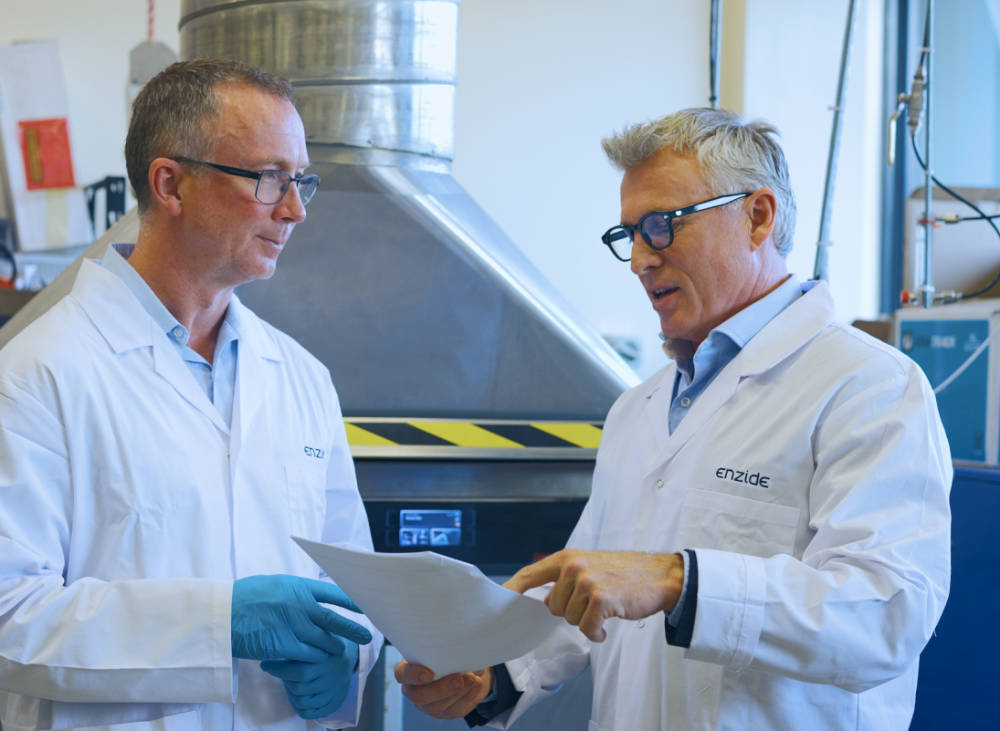‘Plastic without pollution’ – how Enzide is tackling a major environmental problem

Enzide Technologies is working to solve the plastic pollution problem. Pic: Getty Images
- Enzide Technologies worked with CSIRO to develop plastic-eating super enzyme technology
- Patented technology works to break down plastics when they have finished being used
- Company working to advance its tech and get it out of the lab and into ‘real life’ for impact
Plastic pollution has been touted as a major global problem with the United Nations Environment Programme (UNEP) estimating between 19 to 23 million tonnes of plastic waste annually leaks into aquatic ecosystems, contaminating lakes, rivers, and oceans.
The UNEP says equivalent of 2,000 garbage trucks full of plastic are dumped into the world’s oceans, rivers, and lakes daily.
The organisation says that plastic pollution can disrupt habitats and natural processes, diminishing ecosystems’ resilience to climate change and impacting the livelihoods, food production capacity, and social well-being of millions of people.
Effects of chemicals in plastic on human health is also coming under scrutiny. Perth-based Minderoo Foundation has undertaken the first ever Plastic Health Map collating research measuring the potential human health effects caused by a wide range of plastic chemicals.
According to the foundation’s website the map brings together data from more than 3,500 primary studies from 1960 to 2022, which can be explored by researchers, clinicians, and policymakers.
What is the answer to plastic pollution?
One Australian company is working to tackle the plastic pollution problem with plastic-eating super enzyme technology developed by leading scientists at the CSIRO.
Enzide Technologies managing director Marcus Gracey told Stockhead the idea was originally for home compostable coffee pods but the CSIRO lead scientist working on the project Dr Pete Cass introduced the company to emerging enzyme technology which naturally could eat plastics.
“Dr Cass wanted to investigate the opportunity with Enzide Technologies to build those enzymes into biodegradable plastic products during manufacturing so at the end of life they break down very fast,” Gracey says.
“So much of our plastic doesn’t ever get the chance to get to recycling, be processed carefully or turned into new products and is actually dumped and lost into the environment and into our oceans.
“The idea was to build a pollution solution inside plastic from the start and as a company we thought plastic without pollution sounded amazing and we knew it would take Australia’s best scientists to make this happen.”

Gracey says Enzide Technologies was willing to fund the research and support the technology, which is heat stable so it can withstand manufacturing processes, thrives in natural ambient temperatures, and salt water.
“The CSIRO spent five years developing this technology and in 2023 we acquired it outright from the organisation and have now patented it,” he says.
“It can be added inside bioplastic products and can get to work and break down plastics when they have finished being used,” he says.
Cass joined Enzide Technologies as their chief scientist in mid-2023. He says the researchers discovered enzymes found in nature that thrive in harsh environments capable of eating plastics.
“In the lab we were able to make them stronger, work faster and we engineered them to cope with the tough conditions of plastic manufacturing,” he says.
“The enzymes can be added to the plastic while it’s being made or to plastic waste.
“Plastic with our enzyme inside will break apart very fast and microbes finish the job.”
Cass says when the enzymes are done all that is left is water, naturally occurring carbon dioxide and no harmful microplastics.
Enzide Technologies has taken up a lab at Monash University’s Innovation Labs in Melbourne to access Monash’s state-of-the-art facilities and experts to help advance the technology.
Cass says in the Monash lab the company’s researchers are creating new protein formulations and testing degradation of the plastic in water and compost.
Breaking down plastics in weeks, even days
While alternatives such as reusable coffee cups or drink bottles are helping to solve the plastic problems, Gracey says unfortunately plastic is still very much in demand and will be for years to come.
“Data shows plastic production will triple by 2060 and 91% of plastic is never recycled,” he says.
“The big problem for plastic is it can last for hundreds of years and has this weird ability of escaping out into the environment, particularly our oceans.
“Knowing people will continue to use plastic but don’t want the harm that comes from it, we need to fix the plastic problem at manufacturing.”
“What we need is responsible plastic, the uses and convenience without the harm to planet and people.”
Gracey says the optimised enzyme developed and ticked off by CSIRO is now continuing to be worked on with the company having several goals including increasing the speed of degradation.
“We recently put it in thick heavy-duty plastic in the last quarter of last year that would normally last years and got it to break down within weeks,” he says.
“We will make the technology better in the next 12 months so that plastic will break down in days.”
Collaboration discussions underway
Gracey says the company is having discussions with a leading global enzyme developer based in the US to fast track further development of its patented enzyme technology to make it even more heat tolerant, stable, and quicker acting.
“We are also starting to talk with an interesting company in Europe well-known for developing no-impact products,” he says.
He says the European company had previously explored enzymes inside plastics but couldn’t make it work because they were using off-the-shelf technology which couldn’t withstand the heat of manufacturing.
“Ours has been designed by the CSIRO to withstand those processes,” he says.
“With our US-based enzyme company we will make the technology even better in the next year and with our European product manufacturer we will test it in products people would recognise.”
Gracey says the two products the company is heading towards – because they’re a big environmental problem – are e-commerce packaging and plastic bags.
“In Australia we’ve got used to the bans on plastic bags but globally in 2024 the world will use 5 trillion plastic bags, it’s a horrendous problem,” he says.
“Bags and e-commerce packaging ends up in the environment causing grief and that’s not just us saying that but the UN, OECD and other environmental organisations.”
Gracey says there is huge demand from brands and consumers as well for packaging that doesn’t harm the environment.
“Packaging may say it’s recyclable or compostable but in the fine print often says it has to be collected or taken to a special industrial facility,” he says.
“We will design our products to the highest home compost and ocean certifications.”
“People want to be able to conveniently dispose of packaging at home and know hand on heart that it composts just like any other organic matter; our technology makes that happen.”
“They also want to know that if it escapes into the wild that it won’t cause harm, Enzide makes that possible.”
Investing for the environmental good
Gracey says Enzide Technologies offers investors, manufacturers, and consumers a credible alternative to fossil fuel and single-use plastic, with patented, scalable technology and significant market demand.
While not ASX-listed at this stage, the company is progressing B Corporation certification and says it is funded by venture-capitalists and high net-worth investors who see potential in the technology and are wanting to make an impact.
“It’s impact capital, people wanting to make the world a better place through their investments,” Gracey says.
“It’s complex science but a simple idea of plastic without pollution, the photos of plastic after a month of our enzymes eating away are compelling.
The company is capital raising at the moment, which is being managed by the team at Modena Ventures in Perth who were an early investor, to fund development of its enzyme manufacturing additive and first commercial products.
Related Topics
UNLOCK INSIGHTS
Discover the untold stories of emerging ASX stocks.
Daily news and expert analysis, it's free to subscribe.
By proceeding, you confirm you understand that we handle personal information in accordance with our Privacy Policy.








